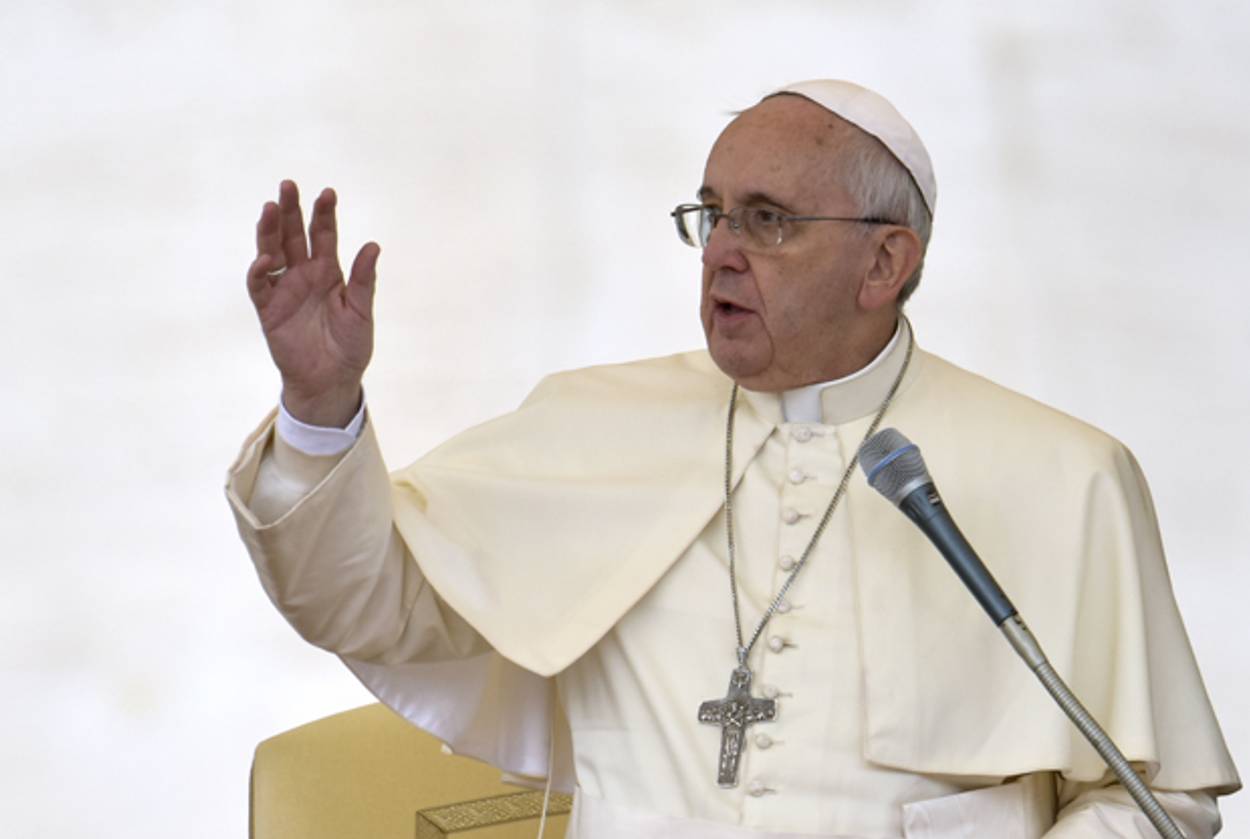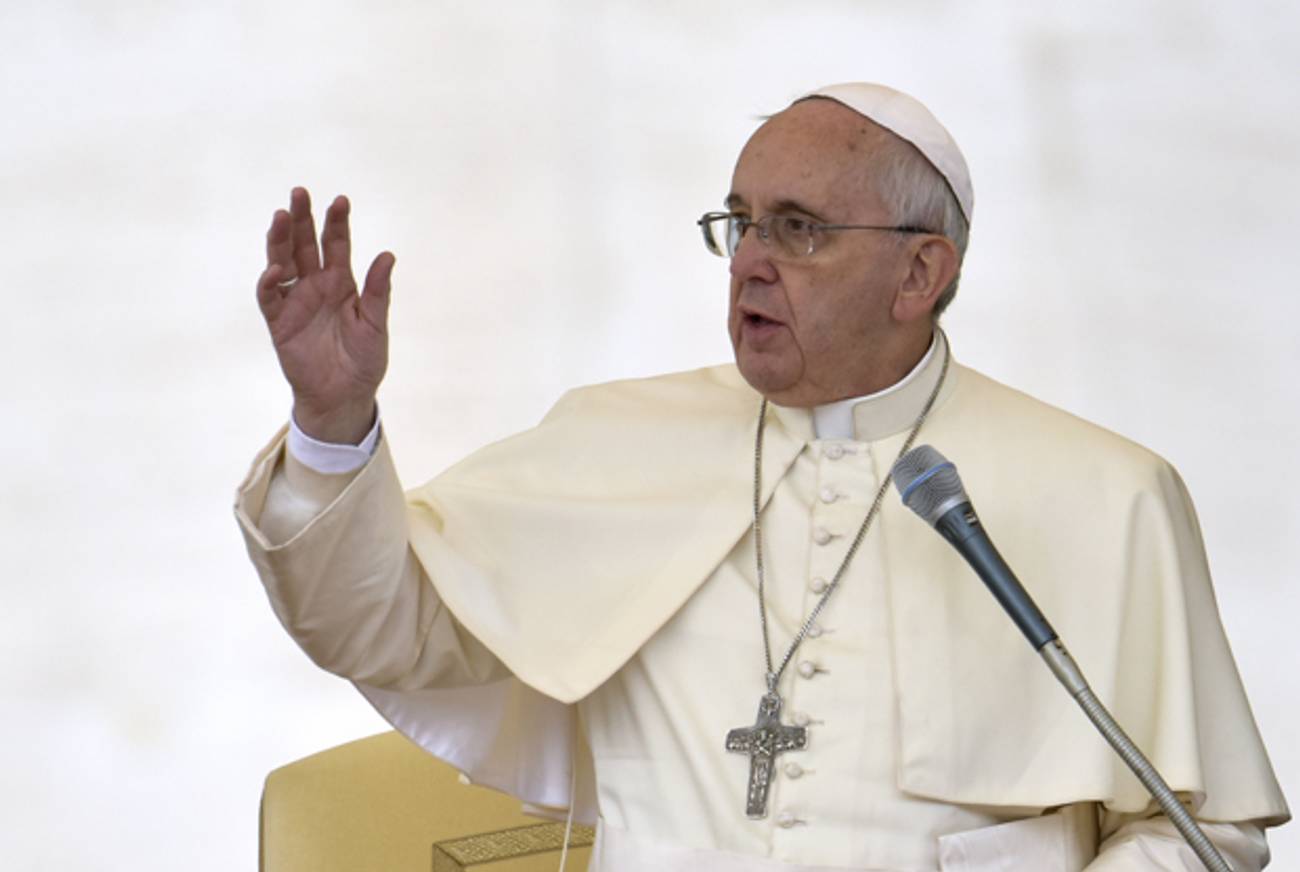Pope Francis Didn’t Revolutionize the Catholic Church’s Stance on Evolution
And the media should stop saying he did




To judge by the breathless media reports, Pope Francis’s comments this week about the compatibility of evolution and religion signaled a sea change in Catholic teaching. “[God] created human beings and let them develop according to the internal laws that he gave to each one so they would reach their fulfillment,” the popular pontiff said, adding that “evolution in nature is not inconsistent with the notion of creation, because evolution requires the creation of beings that evolve.” New York quickly labeled Francis’s words “shockingly progressive” and a “bombshell.” The Daily Beast dubbed them “a small step into a brave new world for Catholics,” while Salon celebrated “a leap forward for the Catholic Church.” Smithsonian declared Francis had repudiated the “creationist- and intelligent design-leaning views of his predecessor, Pope Benedict XVI,” as did Jezebel.
There’s just one small problem with this narrative: the Catholic Church and its Popes have had little quarrel with evolution for decades. Way back in 1950, Pope Pius XII published an encyclical stating that “the Teaching Authority of the Church does not forbid that, in conformity with the present state of human sciences and sacred theology, research and discussions, on the part of men experienced in both fields, take place with regard to the doctrine of evolution.” Pius cautioned that evolution had not yet been proven, but said it did not intrinsically conflict with Catholic doctrine, so long as one continued to believe in the divinity of the soul. Notably, this declaration was made when anti-evolution statutes were still on the books in multiple American states, and at a time when, “in response to sensitivity about the topic, national textbook writers became increasingly less dogmatic in their presentation of Darwinism,” as Edward Larson recounts in his Pulitzer Prize-winning history of the Scopes Trial. So the Church’s stand was far from uncontroversial.
Subsequent Catholic leaders have repeatedly affirmed and expanded this position, as more evidence for evolution has come to light. “Today, more than a half-century after the appearance of that [Pope Pius] encyclical, some new findings lead us toward the recognition of evolution as more than an hypothesis,” Pope John Paul II told the Pontifical Academy of Sciences in 1996. His successor, Pope Benedict XVI, professed confusion with those who found evolution to be in contradiction with the faith, saying in 2007 that “there are so many scientific proofs in favour of evolution which appears to be a reality we can see and which enriches our knowledge of life and being as such.”
In a book-length interview with a journalist published under the title Light of the World in 2010, Benedict told his interlocutor that “evolution has brought forth sexuality for the purpose of reproducing the species. The same thing is true from a theological point of view as well.” Benedict even devoted an entire conference and book to expounding the Church’s position of theistic evolution–that is, the belief that God created man through the natural process of evolution. Indeed, not only has the Vatican consistently confirmed its openness to evolution, its official scientists have rebuffed intelligent design–a proposed counter-theory by some of evolution’s religious critics–bluntly stating that it “isn’t science, even though it pretends to be.”
In other words, when journalists and commentators condescendingly congratulate the Catholic Church for getting over its ignorance, they are in fact exposing their own. Why did some in the media get this story so incredibly wrong? Part of it is simply a lack of grounding in Catholic religious history that extends beyond the trial of Galileo. That episode, while familiar to any middle schooler, is far from the entire story when it comes to the Church’s relationship with science, but often leads the less knowledgeable to presume the two to be in perpetual conflict.
In addition, the misplaced commendation of Pope Francis for simply reiterating longstanding Catholic doctrine is of a piece with the media’s persistent attempt to brand Francis as a profoundly progressive Pope, typically in contrast to his allegedly austere predecessor Benedict. Often, pundits permit this narrative to overpower the facts and history of the Church. BuzzFeed’s Ellie Hall cleverly exposed this tendency by putting together a quiz titled “Who Said It: Pope Benedict or Pope Francis?” Suffice to say, whether on marriage, social justice, or secularism, it is very hard to tell the two men apart on fundamental issues. (None of this is meant to imply that there are no significant differences in approach and worldview between the two Popes, but rather that they are far more subtle than anything identified by the media.)
The press’s evolution errors are not just a journalistic failure because they misreport the past. They also short-circuit an important conversation about the Church’s future. Such ignorance impedes the press from posing tougher and more interesting questions to the Church about evolution and its theological implications, many of which it has yet to officially address. How does Catholicism reconcile its belief in a benevolent creator with a creation governed by the often-cruel process of survival of the fittest? If evolution is true, and man evolved from prior forms of life, how does that impact the Genesis account of the Garden of Eden? How literally should it be taken? Both Catholic and Jewish thinkers have gestured towards these quandaries, but there is far more work to be done. Yet as long as the media is still caught up relitigating whether the Church even accepts evolution, it will never get around to raising them. Consumers of religion reporting–Catholics and non-Catholics alike—deserve better.
Previous: Israel’s Bar-Ilan University Honors Pope Francis
The Netanyahu/Pope Francis Spat That Wasn’t–And Why It Still Matters
Related: When Pope Francis Makes His Visit to Israel, This Rabbi Will Be His Guide
Yair Rosenberg is a senior writer at Tablet. Subscribe to his newsletter, listen to his music, and follow him on Twitter and Facebook.